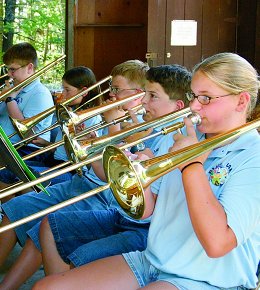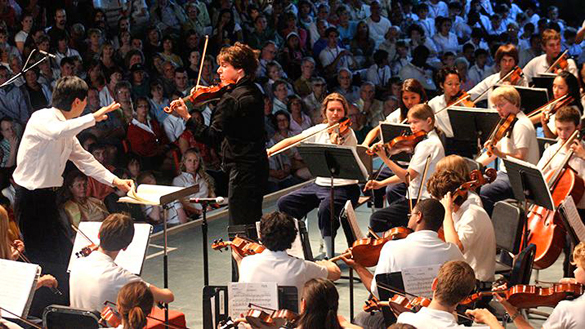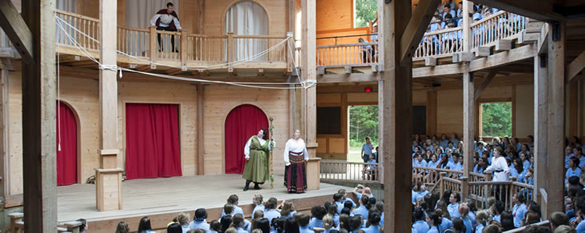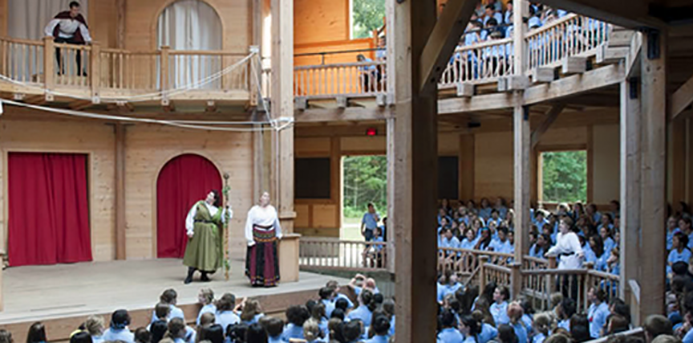 Now’s the time of year to start making summer camp plans for your children.
Now’s the time of year to start making summer camp plans for your children.
Many Chicagoans have a long tradition of sending their youngsters to Blue Lake Fine Arts Camp in central-west Michigan and Interlochen Center for the Arts in northwest Michigan.
Here are some reasons why these camps might be places to consider for your child.
Why Arts Camp?
The benefits and rewards of attending an arts camp are many. For many kids, it’s their first opportunity to connect with other kids who are as passionate about a certain activity as they are. “Everybody here on campus wants to be here and wants to be here in a very sincere way,” says Chris Hintz, national marketing and communications manager for Interlochen. “For the student it’s very eye-opening and rewarding to be around people that care about their art as much as they do.”

Photo courtesy of Interlochen Center for the Arts
About 5,400 students, including many from the Chicago area, attend summer sessions at Blue Lake Fine Arts Camp. The summer arts camp is located on a 1,400-acre campus in Twin Lake, Mich.
“In our idyllic, protected natural setting, our intent is to really give them an experience. When they’re at Blue Lake, they can close the door on the outside world and really be enveloped by nature,” says Bill McFarlin, director of the international program for Blue Lake.
Outstanding Faculty
Both Blue Lake and Interlochen are renowned for the strength and caliber of their faculty.
“It’s something that distinguishes Interlochen from most of the arts programs,” Hintz says. “Most are established teachers, often at the college and university level.”
The counselors at both camps are excellent. McFarlin notes that Blue Lake’s counselors undergo nine days of training before they see their first camper. “Our faculty come from all over the U.S. and Canada. One of the best resources we have is our faculty and our staff,” he says.
A Range of Programs and Lengths of Stay
The length of summer programs at Interlochen vary by age and range from one to six weeks: junior programs are two weeks, intermediate programs are three weeks, and some high school programs are six weeks. Blue Lake offers four 10-day sessions; the first two sessions are for high school students and the second two sessions are for junior high school students.
Although Interlochen is most widely recognized as a music camp, there are many new programs of equal caliber that are less well known, according to Hintz. For its new filmmaking program for high school students, Interlochen brings in filmmakers, screenwriters and faculty members dedicated to the motion picture program, where students work with cameras, sound stages, editing suites and lighting.
“It’s kind of a hidden gem right now,” Hintz says. Other new programs include animation, a singer-songwriter program and rock music program.
At Blue Lake, students declare a major in choir, jazz, piano, harp, band or theater. Students can also select from roughly 30 minors ranging from radio broadcasting to guitar to creative writing. Other examples of minors include fiddling, team sports, conducting, music composition, jazz, contemporary dance, world music, health and fitness, and radio broadcasting. “There are always new and interesting minors,” McFarlin says. “It’s always changing.”

Photo courtesy of Blue Lake Fine Arts Camp
Each student also has the opportunity to see opera during their stay at Blue Lake as well as live Shakespeare in the new Elizabethan theater. Interlochen, of course, offers similar opportunities to see live performances.
Cost and Application Timeline
The cost to attend Blue Lake is typically about $1,000 to $1,200 depending on the program selected; the cost of Interlochen is $1,000 to $1,600 per week, for programs anywhere from one week to six weeks long (so, the total cost can range up to $7,970). Both camps offer more than $1 million in merit-based scholarships and financial aid. Camp registration is first come, first served at Blue Lake and it has sold out every year, McFarlin says.
“We’re usually full by May, but some majors may be filled earlier than that,” he says.
Hintz says that while Interlochen encourages students to submit their applications by February 1, there is still room in most of the programs and the camp considers applications on a rolling basis until the programs fill. He notes that some programs fill very quickly, particularly the theater program.
Interlochen has streamlined the audition process. Although parents and students may get nervous about the thought of the audition, there’s “nothing to lose by submitting an audition to see what happens,” Hintz says.

